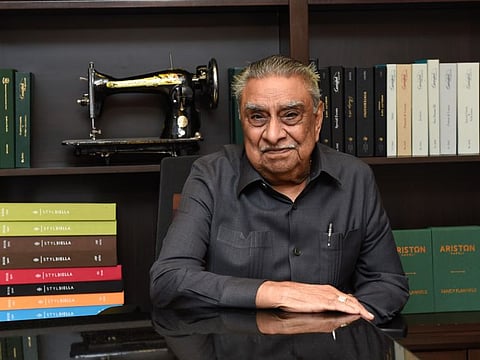Watch: 88-year-old Indian tailor-entrepreneur recalls life in Dubai in the 1950s
The patriarch of Parmar Tailors explains why Dubai has been his home for 65 years

Dubai: When 88-year-old Indian pioneer Pitamber Parmar first arrived in Dubai almost seven decades ago, he had less than a quarter Indian rupee in his pocket. He was carrying only a small luggage containing two trousers, four pyjamas and four shirts. But he had a big dream and a bold plan to set up a tailoring shop in Dubai.
He literally stitched his success story with hard work, faith in himself and help from family and friends. From the first shop he set up next to Juma Masjid in Bur Dubai in 1956, he expanded his business into several stores and bespoke lines across Dubai and turned them into a multi-million dirham tailoring and textile business.
Parmar Tailors has made suits in the past 65 years for royals, Sheikhs, CEOs, traders, businessmen, Western and Asian expats and Emiratis. He has a big factory in Dubai Investments Park and he employs around 90 tailors and staff. His bespoke suits range from Dh2,000 to Dh125,000.
A five-night journey
But it was just like yesterday when he first arrived after a six-day and five-night journey on a cargo steamboat from Bombay (now Mumbai) to Karachi, then Gwadar, Pasni, Muscat and finally Dubai.
The Parmars actually came from a long family of tailors. Parmar — whose name in Hindi means one who is donning a yellow garment — was nine when he was taught tailoring by his older brother. Parmar is originally from the Junagadh district of Gujarat. He moved to Mumbai after being orphaned and then migrated to Dubai at 23 because he saw an opportunity here and believed in the great potential of Dubai.
Sharp as a needle
Speaking exclusively to Gulf News days before the UAE’s Golden Jubilee, Parmar’s memory is as sharp as a needle. He recalled: “I left Bombay on June 5, 1956, and reached Dubai on June 10.
“I paid 88 Indian rupees for the sea journey that had started from the port of Bombay and then on to Karachi, Gwadar, Pasni, Muscat and Dubai. The fare included breakfast, lunch, tea and dinner. It was a cargo steamboat and we were about 30 passengers,” he continued.
It was the start of the monsoon season in India and the waves were high when the boat sailed off. But after a couple of days, as it entered the Arabian Gulf, the sea became placid, stable and calmer.
“There was no port, just a small jetty, and we had to transfer to a small dhow [wooden boat] to enter the city. There was only a sand road and the mode of transportation was either by horse carriage or rickshaw. I just walked from the wharf to the house where I first stayed,” Parmar recalled, adding: “I had less than a quarter Indian rupee left in my pocket and a small bag with two trousers, four pyjamas and four shirts.”
Parmar first lived in a hut compound near what is now Dubai Museum. He shared: “During peak summer, it was too hot. We would pour water on to the sand and a rubber mat to cool our beds at night.” There was neither any electricity nor any air-conditioning yet. There was no police and the local currency was the Indian rupee.
Water, which was categorised into being sweet (meaning drinkable) and salty, was delivered by the sellers to our homes on donkeys. A 20-litre of sweet water stored in tin cans was sold at one rupee and salt water — used for bathing and cleaning — was half a rupee, according to Parmar.
Tailored by the times
Life was harsh by today’s standards, Parmar said. There were no roads, no streetlights, no running water supply. Life was simple back then and it was a time when everybody knew each other and everyone would help someone to start a new life, he said. Parmar added: “With the help of a small loan from Umrao Singh, a renowned tea trader who had invited me to come to Dubai, I set up my first shop near the masjid in Bur Dubai.”
His first store was bare and minimal. Parmar had no helper. There were only a few tailors in Dubai the, but demand was already high. With a foot-pedal sewing machine, Parmar used to work until late at night, with just a Petromax, a pressurised paraffin or kerosene lamp, to lit up his work place.
Parmar built a loyal clientele. After six years, in 1962, he opened a bigger second shop near the abra station in Bur Dubai, followed by one more opposite it.
Family ties
Parmar’s wife, Vijaya, followed him to Dubai in 1959. She initially stayed with him only for six months and then returned to India to give birth to their first child, Pravina, in 1960. The mother and daughter were back in Dubai in 1961 and the Parmars started their own family. The next child, Hansa, was born in 1962 at Parmar’s house in Bur Dubai. Five more children — Bharat (son, born in 1963), Bina (daughter, 1965), Dharmendra (son, 1967), Prakash (son, 1969) and Priti (daughter, 1971) — followed, who were all born in Dubai hospitals.
“In 1971, my youngest daughter was born and it was the same year the UAE was formed,” Parmar reminisced with delight.
Today, the family enterprise is being run by brothers Bharat and Prakash, who joined the business straight from high school. Prakash is the CEO, Bharat, a company director, while Dharmendra is a non-executive director.
Asked to sum up the almost seven decades of his life in Dubai, Parmar says: “Shunya se saukar — from rags to riches.”
“Dubai is my home and the UAE is my country,” he adds.
Sign up for the Daily Briefing
Get the latest news and updates straight to your inbox





